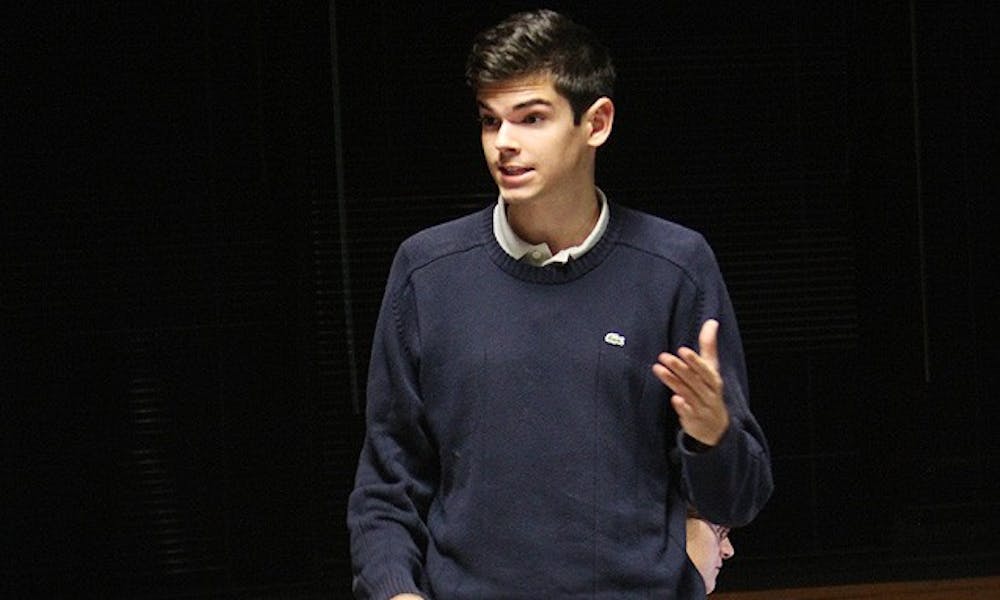After two and a half hours of debate that ended with a tabling of the discussion, Duke Student Government passed several amendments to the Young Trustee campaign bylaws. Next week, DSG will vote on the remaining amendments and the revised bylaw, including all of the amendments, which must pass with a two-thirds vote.
One major amendment that DSG passed will eliminate instant-runoff voting and replace it with a hybrid system that will combine first-past-the-post and IRV systems.
In an IRV system, voters rank candidates in order of preference. In the first round, voters are tallied by first preference, and if no candidate has the majority of votes, the candidate with the fewest votes is eliminated and that candidate’s votes are counted at full value according to next preference on each ballot. In an FPTP system, the election is determined by the highest polling candidate.
The hybrid system proposed will still have voters rank candidates according to preference. However, now if a candidate has more than 40 percent of the vote—rather than 50 percent—there will be no runoff. If a candidate does not win more than 40 percent plurality, then the IRV will occur until a candidate achieves 40 percent of the vote.
Last year, the IRV process created a controversy in the final voting process, when none of the three finalists won the majority of votes. Zach Perret, Trinity ’10, received the fewest votes among the three finalists, so his voters’ second choices were added to the totals of Chelsea Goldstein and John Harpham, both Trinity ’10. In the end, Harpham won by three votes, though Goldstein had received the most first-choice votes.
Executive Vice President Pete Schork, a junior who is against the hybrid model and prefers the FPTP system, believes that last year’s controversy influenced several of the amendments presented at the DSG meeting.
“I think that in general, coming out of last year, people longed for a more transparent process, starting with the actual nominees and following through with the regulation of the election,” Schork said. “[Last year] definitely influenced the transition from the IRV to the hybrid IRV and FPTP system.”
Two weeks ago, the rules committee met to make changes to the Young Trustee bylaw, which included requiring the Young Trustee Nominating Committee to meet before Winter Break to finalize the process of interviewing and discussing candidates. This will eventually have to be passed by the Senate. In the past week, senators submitted amendments to the bylaw by e-mail, which were presented Wednesday night at the DSG meeting.
Several other amendments include the elimination of the student group component of the YTNC. Currently, six of the YTNC members are self-nominated from among the presidents of student groups. Senior Ben Bergmann, an athletics and campus services senator, presented this amendment, along with several other amendments, stating that allowing self-selected members to serve on the YTNC is undemocratic.
“Self-selected students should not have a role in this process,” Bergmann said. “The members of DSG on the YTNC are elected by students at large, not selected through the intermediate process that the [student group] members are selected through. DSG members are more able to speak on behalf of the general student body.”
Bergmann also presented another amendment which would require YTNC members to conduct preliminary interviews of all applicants in order to lessen the advantages that some candidates who know members of the YTNC may have over other equally-qualified candidates.
Other amendments include changes to the process of discussing candidates. The YTNC will now be able to discuss aspects of a candidate’s background, and each Young Trustee candidate can submit a character reference written by a member of the Duke community.
In other business:
Sophomore Harry Liberman, an athletics and campus services senator, presented a proposal to encourage Duke Parking and Transportation Services to eliminate portions of the nighttime C-2 bus route. After 8 p.m., the C-2 buses would no longer stop along Yearby Ave., Flowers Dr., Erwin Rd. or Swift Ave. Liberman noted that this route would save three minutes of travel time.
Sophomore Chris Brown, vice president for athletics and campus services, voiced his support for this proposal and cited alternatives for students who depend on bus stops along the routes that may be eliminated.
“There is also a van service that runs starting at 5 p.m., which is there to supplement the service of the buses,” Brown said. “In this situation, as soon as this change takes place, you will be able to call a van.”
Student Organization Finance Committee Chair Max Tabachnik, a senior, presented three clubs to be approved by DSG: the Duke Venture Capital Club, Duke Jazz Choir, and Neurogenesis: The Journal of Undergraduate Neuroscience.
DSG also passed a resolution to recognize the contributions of senior Drew Everson, who died Oct. 23 after an accidental fall. Members of Everson’s fraternity, Pi Kappa Phi, came to the meeting to receive condolences from DSG.
Get The Chronicle straight to your inbox
Signup for our weekly newsletter. Cancel at any time.

